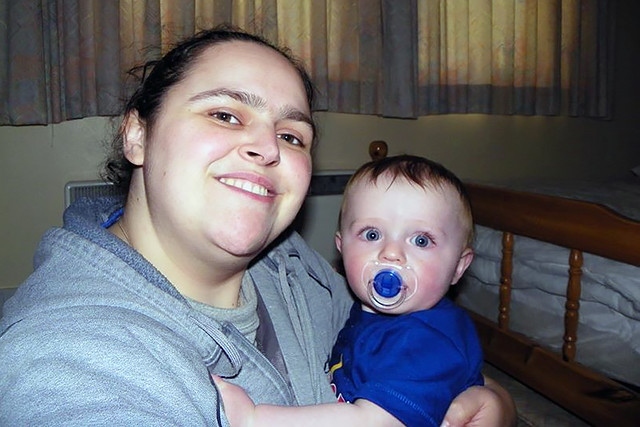Sabrina Branwood shares her experiences with selective mutism
Date published: 09 December 2016

Sabrina Branwood with her nephew Theo
Sabrina Branwood hopes by sharing her experiences with selective mutism that others will be inspired to seek similar help and support each other.
Selective mutism is ‘a severe anxiety disorder where a person is unable to speak in certain social situations’. It thought to affect one in 140 young children and is more common in girls and children learning a second language. Symptoms typically show between the ages for two and four.
Sabrina, 36, is the only person in her family with the condition, which affects both her verbal and non-verbal communication.
She said: “It was such a life changing thing to realise my difficulties weren’t my fault, that I wasn’t alone and that other people have it too. It’s been great to meet so many lovely people who are so understanding and able to help support both other people with the condition and people working with sufferers.”
She continued: “A lady called Maggie Johnson has helped and supported me so much as she has over 20 years’ of experience of working with those with selective mutism. She delivers training and has co-authored books about the condition. She’s helped me the most because she both cares and understands the condition.”
Sabrina was diagnosed at the age of 26 after five years of therapy when a worker at the therapy centre recognised Sabrina’s symptoms in a documentary about the condition. As she was being discharged at the time, she received a last-minute referral to Rochdale & District Mind, where she says she found ‘very understanding people’.
Speaking about her symptoms, she said: “The anxiety that causes my selective mutism affects me greatly as it is more than just difficulties with talking verbally. As I’ve got older, it has become harder to communicate non-verbally too, so emails can be hard as well. It’s especially a challenge with new people and I find communicating and interacting with them very difficult.
“As a child, it was really hard growing up with the condition as no-one had heard of it. I have had it for as long as I can remember and I was classed as shy and quiet when younger. I struggled in school. I also had depression which nobody noticed and I couldn’t say anything, not even when I was being bulled.”
She added: “It was harder as I got older because I found it hard to do things that people just expect you to be able to do as you get older.”
Sabrina moved from using the services provided to volunteering to raise awareness of selective mutism. She also volunteers with the Pennine Care community paediatric service in Rochdale and is studying part-time for a degree in psychology.
She said: “It can affect my volunteering and people I don’t know can be difficult as many people aren’t aware of selective mutism, so when I can’t talk, they think I don’t hear or understand them. When I first started volunteering, I used to freeze a lot and I would be so anxious around people that I couldn’t even move to leave the room.
“Tailored support for those of us with the condition and a ‘baby-steps approach’ is what helps us the most.”
Sabrina is currently applying for funding to organise training for the condition in Rochdale. Last year she met other sufferers in Rochdale after a coffee morning was held by Rochdale & District Mind to raise awareness for the condition.
She says there is ‘some’ help for children that depends on awareness of the schools and services have of the condition.
“There is no help for adults, no services that treat it and most services, including ones I’ve tried to access in Rochdale, aren’t even aware of the condition. I was once offered access to primary care mental health services which offer short term interventions, which would not have helped. I’ve been refused access to secondary care mental health services and been told I don’t meet the criteria and speech and language therapy services aren’t funded to work with adults with my difficulties,” Sabrina said.
Symptoms of selective mutism include: inability to engage with different people, particularly new faces, appearing nervous, uneasy or ‘awkward’ and rude or shy behaviour in children.
It can carry on into adulthood and may affect spoken, written or gestured communication in those who are more severely affected.
Do you have a story for us?
Let us know by emailing news@rochdaleonline.co.uk
All contact will be treated in confidence.
Most Viewed News Stories
To contact the Rochdale Online news desk, email news@rochdaleonline.co.uk or visit our news submission page.
To get the latest news on your desktop or mobile, follow Rochdale Online on Twitter and Facebook.

